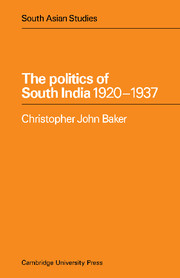Book contents
- Frontmatter
- Contents
- List of maps and tables
- Preface
- Notes on references, transliteration and abbreviations
- 1 Madras Presidency–natural features, regions and languages
- 2 Madras Presidency – districts
- 3 Madras Presidency – municipal towns
- 1 Politics and the Province: the Justice party
- 2 The province and the locality
- 3 Depression, dissent and disengagement
- 4 The ascent of the congress
- Conclusion
- Biographical notes
- Glossary
- Bibliography
- Index
2 - The province and the locality
Published online by Cambridge University Press: 27 October 2009
- Frontmatter
- Contents
- List of maps and tables
- Preface
- Notes on references, transliteration and abbreviations
- 1 Madras Presidency–natural features, regions and languages
- 2 Madras Presidency – districts
- 3 Madras Presidency – municipal towns
- 1 Politics and the Province: the Justice party
- 2 The province and the locality
- 3 Depression, dissent and disengagement
- 4 The ascent of the congress
- Conclusion
- Biographical notes
- Glossary
- Bibliography
- Index
Summary
‘Politicians’, as one prominent Madras politician told the Royal Commission on Agriculture in 1927, ‘only take care of themselves. They want something which they call by various names, but they do not impart it to the villagers. The villagers’ demand is only an ignorant demand; they do not know what it is the politicians are asking for.’ The speaker himself came from the mofussil, even owned land in the villages of Godavari district, and yet he felt that there was a great gulf between the world of provincial politics and the world of villages and up-country towns. Indeed the style of politics at the capital – the gentlemanly and sometimes not-so-gentlemanly court politics of Governor, ministers and legislators – seemed insulated from the hurly-burly of mofussil society. By deploying the patronage of government, the Justice leaders could just about satisfy all the up-country men whom they felt they had to satisfy. Like the administrators before them, the new politicians of the Legislative Council found the superficial calm of Madras society worked to their advantage; they were not pushed this way and that by agitations or by the whims of popular sentiment.
But below the surface, south Indian society was far from peaceful; indeed in many ways it was as violent as the legendary wild west. The principal cases’, wrote a biographer about a legal practice in an up-country town, ‘related to murders which were common. There were two types of murders, those caused by sex rivalry and those due to village feuds.
- Type
- Chapter
- Information
- The Politics of South India 1920–1937 , pp. 85 - 168Publisher: Cambridge University PressPrint publication year: 1976



